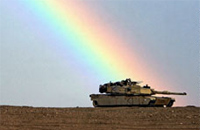General Wants Gay Ban Lifted

Military.com
In an op-ed published in Tuesday's New York Times, John M. Shalikashvili, retired Chairman of the Joint Chiefs of Staff, says Congress should give "serious reconsideration" to "Don't Ask, Don't Tell," the ban on openly lesbian, gay and bisexual military personnel. Shalikashvili, who supported the ban on open service in 1993, writes that "I now believe that if gay men and lesbians served openly in the United States military, they would not undermine the efficacy of the armed forces," and goes on to say that "Our military has been stretched thin by our deployments in the Middle East, and we must welcome the service of any American who is willing and able to do the job."
"'Don't Ask, Don't Tell' is out of step with both the American public and those within our armed forces," said C. Dixon Osburn, executive director of Servicemembers Legal Defense Network (SLDN). "The counsel of military leaders increasingly supports repeal of the law. Congress must, as General Shalikashvili urges, consider the overwhelming evidence of the past fourteen years. If they do, the clear answer is that we must lift the ban."
Shalikashvili, who was Chairman of the Joint Chiefs from 1993 to 1997, joins other senior retired military officers who have called for repeal of "Don't Ask, Don't Tell." In May 2006, Lieutenant General Claudia Kennedy, USA (Ret.), the first female three-star officer in Army history, called the law "a hollow policy that serves no useful purpose." Lieutenant General Daniel W. Christman, former superintendent of West Point, recently told The New York Times that "It is clear that national attitudes toward this issue have evolved considerably in the last decade. This has been led by a new generation of service members who take a more relaxed and tolerant view toward homosexuality." Retired Admiral John Hutson, who currently serves as Dean of Franklin Pierce Law School, also recently wrote that "It would be a great tragedy if we didn't take advantage of (the) chance to correct a flawed policy."
In 2003, two retired generals and an admiral 'came out' in the New York Times, and in November 2006 fourteen senior retired military officers urged the First Circuit Court of Appeals to overturn the ban. They wrote that the law "undermines the military's ability to fulfill its primary mission of providing national security by discouraging the enlistment of gay persons qualified to serve their country and by expelling from the military those who have served with honor."
OK, I admit, I have a problem with this. I view homosexuality as deviant behavior. I don't for one second believe that people are born homosexuals simply because it is a behavior, NOT a characteristic. I argued with a liberal individual on another blog several months ago about this issue, and his position was that people cannot choose to be gay or straight anymore that they can choose to be black or Hispanic.
Another commenter stated succinctly, that though he knew several people who formerly lived a homosexual lifestyle, he knew of no former blacks, or Hispanics.
With that being said, enlisting or commissioning men and women who are clearly unstable in their perception of normal sexual behavior would definitely be a detriment to the esprit de corps of all services. Here's why:
Civilians who have not served in the military typically do not understand the 'close quarters' environment that exists in the military. The very long work hours coupled with little or no time off, will, in my opinion create an 'in your face' hostile environment that will not be good for anyone.
Granted, there is a shortage of troops; however, lowering the standards on any level will certainly diminish the performance of our military.



<< Home